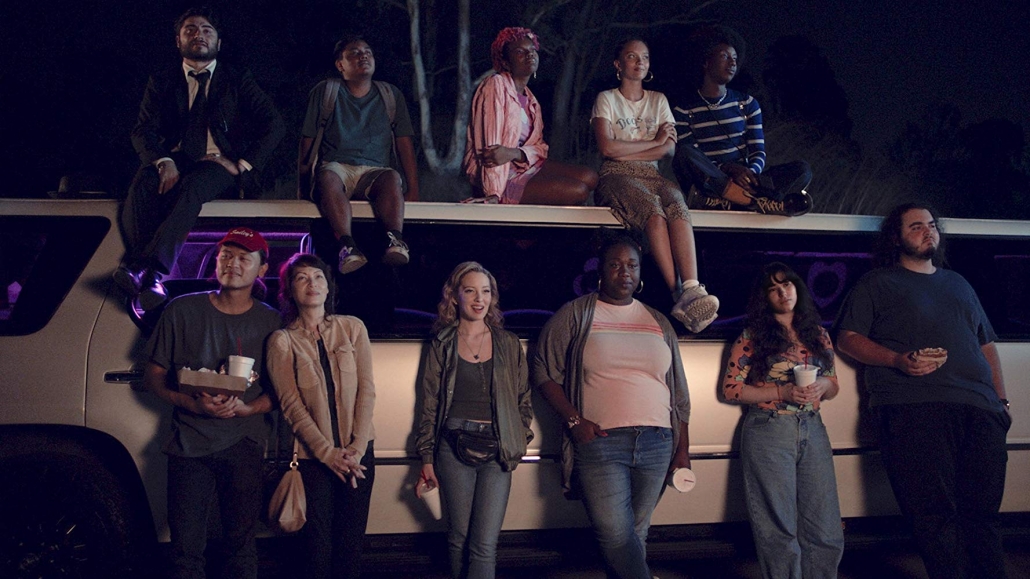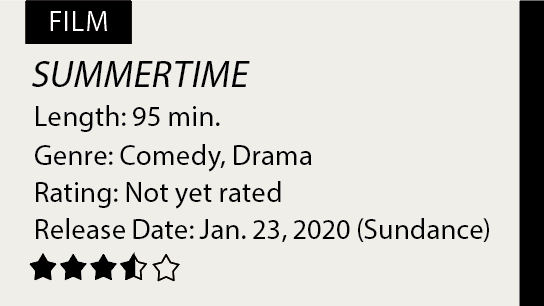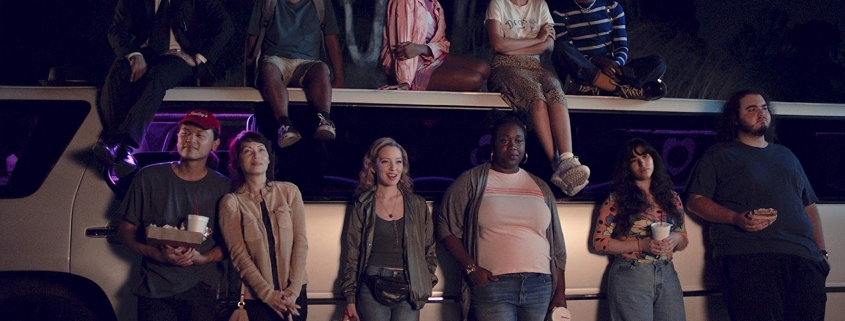‘Summertime’ is a teen love letter to Los Angeles

What is “Summertime?”
“Summertime” is a hunt for juicy cheeseburgers. It’s swans floating in Echo Park, drenched in the amber light of California dusk. It’s emo folk songs on public transportation and graffiti art. It’s car sex under shimmering fireworks and uncouth therapy. It’s a celebration of home.
If that feels like a preposterous way to begin a film review, good, because “Summertime,” the newest work by director Carlos Lopéz Estrada that premiered at the 2020 Sundance Film Festival this weekend, is a preposterous movie. It is also poetic — in every sense of the word. All the aforementioned metaphors aren’t just metaphors; they’re literal events and images that take place during the movie. It is also uplifting, quixotic, confrontational, awkward, funny, woke, clumsy and, above all, original. It is an everything-but-the-kitchen-sink approach to cinema and, because of this, it somehow stylistically, tonally and thematically hybridizes “Rent” and “Love Actually.”
The premise is simple: real Southern California teenagers spending time in L.A., a metropolis they all have a deeply personal relationship with, over the summer. But they’re not just teenagers. They’re poets — really talented poets of different ethnic backgrounds, sexualities and genders who all have their own style and voice and share them in their own distinctive way.
The piece functions like a series of vignettes, each climaxing in a soliloquy from a young player involved. Some of these poems are silly; some are deeply moving; others aren’t quite sure what they are, but all come from an authentic place and do their best to capture the true darkness and ecstasy of being a young person in a heavily fantasized city (hence the “Rent” similarities).
Many of these vignettes all weave together by the end of the picture. Estrada’s camera effortlessly moves from the wrap-up of one character’s storyline to another’s in a way that is swift, efficient and a bit overwhelming. Like “Love Actually,” it’s all cyclical, tidying itself up in one complete narrative by the end like clockwork, which is an even more resonant statement once you see the film.
Estrada deserves commendation for his choice to make this movie. Fresh off the universal critical acclaim from “Blindspotting,” he could’ve easily capitalized on that momentum to make another tightly-polished film in which he had complete creative control. But he didn’t. Not only did he focus on capturing a completely different story, he trusted several new young minds to be the storytellers.
The 25 spoken word poets in “Summertime” are not professional actors. The words they speak and perform are entirely their own. They were mentored through the “Get Lit” program, a California-based nonprofit aimed at empowering children through literature and poetry. These young artists succeed in spades without watering down who they are. Feats of uncompromising creativity are rare, and it is a treasure to witness how much kindling Estrada provided to the sparks the “Get Lit” program has been igniting for years.
The script also deserves immense praise, the bulk of it being written by the young artists who articulate their poems with conviction. Most content about teenagers (“Freaks and Geeks,” “Eighth Grade”) often utilizes intentional awkwardness and strategically placed “um’s” to show that, no, not all teens are Aaron Sorkins spouting around wittily. While these works are wonderful, “Summertime” takes an opposite, equally delightful approach, proving there are also young people who can rival Shakespeare, using rich language to paint the world’s vocabulary “as it could be.”
And, the cast is overflowing with potential: Mila Cuda, a lyrical reincarnation of Allen Ginsberg and physical doppelganger of Saoirse Ronan, delivers verses that could genuinely shape a generation throughout film. The young Marquesha Babers’ ability to seamlessly switch from poignant and hilarious wisdom far beyond her years to quickly unraveling vulnerability elevates her to the company of Oscar-winning actresses twice her age. Tyris Winter creates a Cirque-du-Soleil-level balancing act between passionate youthful flamboyance and soft paternal empathy. It’s a candy store of debuting talent, and it would be no surprise if “Summertime” is the launching pad for several careers.
That’s what “Summertime” does right. It’s not perfect, though.
There are over two dozen artists featured in the film, each with something substantive to say and “Summertime’s” 95-minute run time is unfortunately not enough to provide the necessary breathing room for all these poems to create lasting feelings of catharsis.
In this way, the film would serve better as a series, with each episode focusing on a different character, allowing time to create a boiling tension, before exploding with character-heavy emotion like many of the poems do. Instead, some of the acidic wit in “Summertime” feels blurted out prematurely. Estrada tries to make up for this, using reaction shots and comedy, but this is one of the rare occasions where brevity is a weapon against a film.
Because spoken word poetry is such an audience-interactive art form, witnessing it in silence through a screen muffles some of its beauty. Estrada tries to substitute snaps and cheers with stunning orchestral swells and tight close-ups which the poets play like fiddles, but watch a live clip of any of these featured poems and try not to think there’s something missing.
But “Summertime’s” occasional disarray is part of its charm. The film itself functions exactly as it intends: as a love poem to L.A. written by teens. Looking back on it in five years, parts of it may seem overly sentimental, a bit angsty and lost — but so it goes with all parts of adolescence. The film does so much correctly, and it’s the first of its kind to do so. It’s dreamy-eyed, fearless and the best movie about L.A. since “La La Land.” It’s a unique coming-of-age classic worth seeing as soon as possible.


